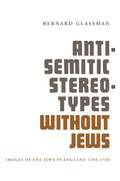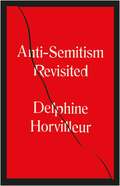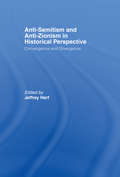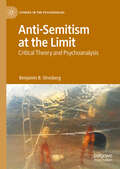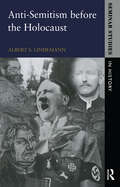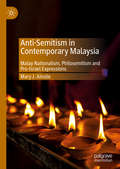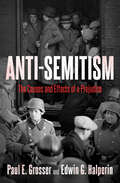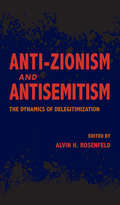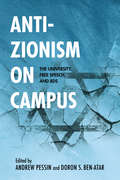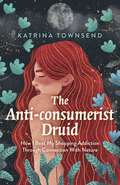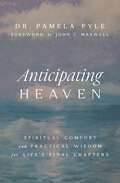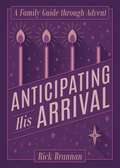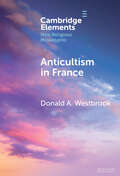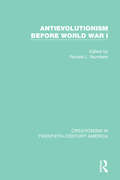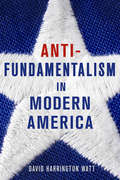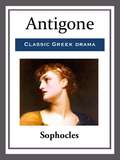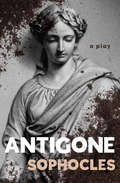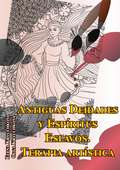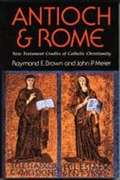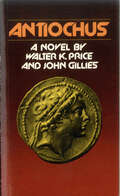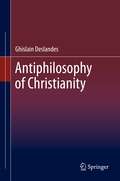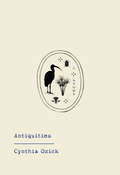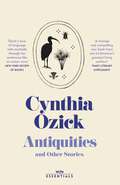- Table View
- List View
Anti-Semitic Stereotypes without Jews: Images of the Jews in England 1290-1700
by Bernard GlassmanAnti-Semitic Stereotypes Without Jews offers an exploration of English history, 1290- 1700, tracing the growth and development of these attitudes. It demonstrates that it is possible for prejudice to thrive even in the absence of a scapegoat group. Following the expulsion in the year 1290 until 1656, although there was no real Jewish community in England, the molders of public opinion kept a shadowy image of the Jew alive through sermons and religious tracts, travelogues, folklore, religious and secular drama. In his analysis, Dr. Glassman shows that despite their theological differences, Anglican, Puritan, and Catholic clergymen concurred in the negative images of Jews presented to their congregations. They pictured the Jews as Christ-killers, and related myths of how Jews performed barbaric and sacrilegious rituals. The image was to plague Anglo-Jewry after a small community was reestablished in the second half of the 17th century. The author's belief that anti-Semitism is primarily a Christian problem transcends both time and place is covered by this volume. Anti-Semitic sentiments are seen here as reflecting deep-seated, irrational responses to the Jewish people, rooted in the teachings of the church and exploited by men who needed an outlet for religious, social, and economic frustrations.
Anti-Semitism Revisited: How the Rabbis Made Sense of Hatred
by Delphine HorvilleurRabbi Delphine Horvilleur analyses the phenomenon of anti-semitism as it is viewed by those who endure it and who, through narration and literature, succeed in overcoming it. Jewish texts are replete with treatments of anti-semitism, of this endlessly paradoxical hatred, and of the ways in which Jews are perceived by others. But here, the focus is inverted: Anti-Semitism Revisited explores the hatred of Jews as seen through the lens of the sacred texts, rabbinical tradition and Jewish lore. Delphine Horvilleur gives a voice to those who are too often deprived of one, examining resilience in the face of adversity and the legacy of an ancient hatred that is often misunderstood. An engaging, hopeful and very original examination of anti-semitism: what it means, where it comes from, what are the ancient myths and tropes that are weaponised against Jewish people, and how do we take them apart.
Anti-Semitism Revisited: How the Rabbis Made Sense of Hatred
by Delphine Horvilleur"Anti-Semitism revisited in a wholly original way" Philippe Sands"Rippling with ideas on every page" Jewish Chronicle"Tackles the issue [of anti-semitism] from the perspective of a country where its manifestations have been more vicious and deadly" Financial TimesRabbi Delphine Horvilleur analyses the phenomenon of anti-semitism as it is viewed by those who endure it and who, through narration and literature, succeed in overcoming it. Jewish texts are replete with treatments of anti-semitism, of this endlessly paradoxical hatred, and of the ways in which Jews are perceived by others. But here, the focus is inverted: Anti-Semitism Revisited explores the hatred of Jews as seen through the lens of the sacred texts, rabbinical tradition and Jewish lore. Delphine Horvilleur gives a voice to those who are too often deprived of one, examining resilience in the face of adversity and the legacy of an ancient hatred that is often misunderstood. An engaging, hopeful and very original examination of anti-semitism: what it means, where it comes from, what are the ancient myths and tropes that are weaponised against Jewish people, and how do we take them apart.Translated from the French by Ruth Diver
Anti-Semitism and Anti-Zionism in Historical Perspective: Convergence and Divergence
by Jeffrey HerfPreviously published as a special issue of The Journal of Israeli History, this book presents the reflections of historians from Israel, Europe, Canada and the United States concerning the similarities and differences between anti-Zionism and anti-Semitism primarily in Europe and the Middle East. Spanning the past century, the essays explore the continuum of critique from early challenges to Zionism and they offer criteria to ascertain when criticism with particular policies has and has not coalesced into an "ism" of anti-Zionism and anti-Semitism. Including studies of England, France, Germany, Poland, the United States, Iran and Israel, the volume also examines the elements of continuity and break in European traditions of anti-Semitism and anti-Zionism when they diffused to the Arab and Islamic. Essential course reading for students of religious history.
Anti-Semitism at the Limit: Critical Theory and Psychoanalysis (Studies in the Psychosocial)
by Benjamin B. StrosbergIn this book, Benjamin Strosberg explores difficulties and anxieties inherent in studying, defining, and defending against anti-Semitism by tracing a concurrent difficulty in thinking about Jewishness, which has historically served as a limit case for central social categories such as outsider, religion, race, gender, and nation. Dr. Strosberg draws on Zygmunt Bauman’s concept of proteophobia—the anxious fear of what doesn’t fit into clear-cut categories—to think more carefully about anti-Semitism as response to the complex-realities of ambivalence and otherness. The book proposes ‘negative psychology’ as a methodology for studying anti-Semitism and proteophobia rooted in psychoanalysis and Theodor Adorno’s Critical Theory. Drawing from lived experiences, contemporary events, and debates in the field, this compelling work explores the broad implications of the investigation of anti-Semitism for politics, education, and psychoanalysis, as well as the specific implications for Jewish identity and resistance.
Anti-Semitism before the Holocaust (Seminar Studies)
by Albert S. LindemannAn important new study on a complex and highly controversial topic. Albert Lindemann provides a clear and balanced guide to anti-Semitism from ancient times right through to the twentieth-century inter-war period and the Nazi Holocaust. He looks at all countries where anti-Semitism manifested itself at different times and in different ways xxx; in Russia, the US, Poland, England, Germany, South Africa, and Holland. Throughout he asks difficult and unfamiliar questions to challenge long held and misguided beliefs. An important new study which fills a gap in current literature.
Anti-Semitism in Contemporary Malaysia: Malay Nationalism, Philosemitism and Pro-Israel Expressions (Palgrave Series In Asia And Pacific Studies)
by Mary J. AinslieOffering an empirical study into anti-Semitism and anti-Israel attitudes in Malaysia, this book examines the complicated nature and function of such beliefs within the contemporary context, mapping these discourses onto different ethnic and economic divisions. Based largely upon qualitative interviews with thirty Malaysian participants who detail their own experiences with and perceptions of this phenomenon, the project reveals how political actors and organizations in Malaysia achieve political success and maintain political power through investing in the Palestinian cause, simultaneously demonizing Israel and Jews to an astounding degree. However, the book also reveals how, in contrast to this state-led agenda, challenging anti-Semitism and pushing for dialogue with Israel has become a means by which progressive citizens can critique authorities and reassert their desire for a liberal and heterogenic Malaysia. The book therefore argues that both interest in and even support for Judaism and Israel may be more prominent than the official Malaysian position may suggest, with citizens holding far more complex opinions and views upon this subject matter.
Anti-Semitism: The Causes and Effects of a Prejudice
by Paul E Grosser Edwin G. HalperinThis study examines the long history of hatred Jews have endured at the hands of the Catholic Church from ancient Rome to the twentieth century. Anti-Semitism is one of the oldest, most persistent, and most virulent forms of hatred to plague the world. The Holocaust of World War II was the bitter fruit of centuries of prejudice passed down in Christian teachings and perceptions about the Jewish people. In this book, Paul E. Grosser and Edwin G. Haplerin present a historical analysis of anti-Semitism from the Roman Empire, through the Crusades, the Inquisition, the Reformation, and the twentieth century. Through their analysis, Grosser and Halperin reveal a pattern. They shed light on how, where, and when anti-Semitism has spread; how it is temporarily brought under control; and how it suddenly, in some far part of the world, becomes endemic again. The authors provide an illuminating survey of the causes of anti-Semitism and share theories of how the Jews have been able to survive. In conclusion, they offer some hope for the future.
Anti-Zionism and Antisemitism: The Dynamics of Delegitimization (Studies in Antisemitism)
by Edited by Alvin H. RosenfeldSeventeen essays by scholars examining the links between anti-Semitism and attitudes toward Israel in the current political climate.How and why have anti-Zionism and antisemitism become so radical and widespread? This timely and important volume argues convincingly that today’s inflamed rhetoric exceeds the boundaries of legitimate criticism of the policies and actions of the state of Israel and conflates anti-Zionism with antisemitism. The contributors give the dynamics of this process full theoretical, political, legal, and educational treatment and demonstrate how these forces operate in formal and informal political spheres as well as domestic and transnational spaces. They offer significant historical and global perspectives of the problem, including how Holocaust memory and meaning have been reconfigured and how a singular and distinct project of delegitimization of the Jewish state and its people has solidified. This intensive but extraordinarily rich contribution to the study of antisemitism stands out for its comprehensive overview of an issue that is both historical and strikingly timely.
Anti-Zionism on Campus: The University, Free Speech, and BDS (Studies in Antisemitism)
by Doron S. Ben-Atar Andrew PessinMany scholars have endured the struggle against rising anti-Israel sentiments on college and university campuses worldwide. This volume of personal essays documents and analyzes the deleterious impact of the Boycott, Divestment, and Sanctions (BDS) movement on the most cherished Western institutions. These essays illustrate how anti-Israelism corrodes the academy and its treasured ideals of free speech, civility, respectful discourse, and open research. Nearly every chapter attests to the blurred distinction between anti-Israelism and antisemitism, as well as to hostile learning climates where many Jewish students, staff, and faculty feel increasingly unwelcome and unsafe. Anti-Zionism on Campus provides a testament to the specific ways anti-Israelism manifests on campuses and considers how this chilling and disturbing trend can be combatted.
Anti-consumerist Druid: How I Beat My Shopping Addiction Through Connection With Nature
by Katrina TownsendMany of us are coming to terms with the devastating global effects of overconsumption, and for me the desire to quit shopping has led me to explore Paganism, and then to Druidry! This is not a book about Druidry. This is a book about how I stopped overconsumption consuming me, and on that journey discovered a connection with nature that led to me becoming a student of Druidry, and about how those beliefs and practices helped me to rebuild a more authentic, creative, enchanted life.
Anticipating Heaven: Spiritual Comfort and Practical Wisdom for Life's Final Chapters
by Dr. Pamela PyleIs there a way to walk into the final chapters of life with peace and confidence, and with support and wisdom?We all are living an earthly story with a beginning, middle, and end. While aspects of our story's closing hold mystery, we do not have to feel lost as we move toward it. We instead can lean on the support and wisdom of others who know the path ahead.In Anticipating Heaven, she offers that same practical advice and spiritual comfort to you and your loved ones as you navigate a serious illness.Drawing on her years of experience and strong faith, Dr. Pyle will share inspiring patient stories and clear guidance, helping you tonavigate the world of healthcare with confidence,prepare an end-of-life plan with peace,remember your heavenly destination with hope,embrace the final chapters with love, andanticipate the presence of God and your glorified body with joy. Clarity can replace chaos. Assurance can overcome uncertainty. And love can conquer fear. You are not alone on this path. You are leaving the land of the dying and entering the land of the living, a place God calls home. As one story is closing, a bright new one is beginning.
Anticipating His Arrival: A Family Guide through Advent
by Rick BrannanFamily devotions can be hard to schedule and plan--and doing so in a meaningful way can be especially difficult during the days and weeks leading up to Christmas. As you guide your family through this season, Anticipating His Arrival helps you and your family remember his first advent on Christmas and prepare for his second coming, celebrating and anticipating both events. Each day's Scripture reading includes discussion questions with accompanying responses to make it easy for you to engage the themes of preparation, anticipation, joy, and incarnation throughout the season of Advent. The reading schedule--which begins the first Sunday of Advent and ends on Christmas Day--has been adapted from the Revised Common Lectionary and includes devotions for all three years in the liturgical cycle, with every year drawing on the Synoptic Gospels.
Anticultism in France: Scientology, Religious Freedom, and the Future of New and Minority Religions (Elements in New Religious Movements)
by Donald A. WestbrookThis Element introduces readers to the problem of anticultism and antireligious movements in France. The first section offers an overview of anticultism in France, including the paradoxical place of modern French secularism (laïcité) that has shaped a culture prejudiced against minority religions and new religions (sectes or 'cults') and impacted Europe more broadly. This includes state-sponsored expressions, in particular MIVILUDES, an organization funded by the French government to monitor cultic or sectarian deviances. The second section takes up the case of the American-born Church of Scientology, tracing its history in the country since the late 1950s and how it has become a major focus of anticultists in France. The Element concludes with reflections on the future of new and minority religions in France. A timeline provides major dates in the history of anticultism in modern French history, with a focus on items of relevance to Scientology in France.
Antievolutionism Before World War I
by Ronald L. NumbersOriginally published in 1995, Antievolutionism Before World War I is the first volume in the series, Creationism in Twentieth Century America, reissued in 2021. The volume brings together original sources from the beginning of the twentieth century, critiquing Darwinism and the theory of natural selection. The sources included in this collection debate the role of natural selection in evolution, as well wider aspects of Darwinian theory from a creationist stance. The essays feature prominent figures from the period in the fields of naturalism, philosophy and theology and includes contributions from Alexander Patterson, Eberhard Dennert, Luther Tracy Townsend and George Frederick Wright. The collection will be of especial interest to natural historians, and theologians as well as academics of philosophy, geology and history.
Antifundamentalism in Modern America
by David Harrington WattDavid Harrington Watt's Antifundamentalism in Modern America gives us a pathbreaking account of the role that the fear of fundamentalism has played—and continues to play—in American culture. Fundamentalism has never been a neutral category of analysis, and Watt scrutinizes the various political purposes that the concept has been made to serve. In 1920, the conservative Baptist writer Curtis Lee Laws coined the word "fundamentalists." Watt examines the antifundamentalist polemics of Harry Emerson Fosdick, Talcott Parsons, Stanley Kramer, and Richard Hofstadter, which convinced many Americans that religious fundamentalists were almost by definition backward, intolerant, and anti-intellectual and that fundamentalism was a dangerous form of religion that had no legitimate place in the modern world. For almost fifty years, the concept of fundamentalism was linked almost exclusively to Protestant Christians. The overthrow of the Shah of Iran and the establishment of an Islamic republic led to a more elastic understanding of the nature of fundamentalism. In the late 1970s and early 1980s, Americans became accustomed to using fundamentalism as a way of talking about Muslims, Jews, Hindus, Sikhs, and Buddhists, as well as Christians. Many Americans came to see Protestant fundamentalism as an expression of a larger phenomenon that was wreaking havoc all over the world. Antifundamentalism in Modern America is the first book to provide an overview of the way that the fear of fundamentalism has shaped U.S. culture, and it will lead readers to rethink their understanding of what fundamentalism is and what it does.
Antigone
by SophoclesSophocles addresses themes of civil disobedience, fidelity, and love for family; and questions which law is greater: the gods' or man's--in this play that challenged many established mores of Ancient Greece.
Antigone: A Play (The Oedipus Cycle #3)
by SophoclesThe classic Greek tragedy about a woman who valiantly defies a tyrant to honor her brother and please the gods.When Polynices—a military leaders in Thebes&’s civil war—dies on the battlefield, Thebes&’s ruler, Creon, decrees that Polynices&’s body will lie unburied and left as prey for the vultures. But Antigone, the late warrior&’s sister, answers to a higher authority than the state, and breaks the law to follow her conscience and bury her brother with the proper rites. Antigone&’s act of civil disobedience urges great upheaval in this timeless play that explores the conflicts that can arise between worldly and divine law, and the questions raised by the idea of individual freedom.
Antiguas Deidades y Espíritus Eslavos. Terapia artística
by Olga Kryuchkova Elena KryuchkovaEn los tiempos antiguos, los eslavos adoraban a las fuerzas de la naturaleza, deificando al sol, al agua, a la lluvia, a la luna y a otros fenómenos naturales. Los eslavos creían que su vida estaba sujeta a la voluntad de seres superiores, deidades. De acuerdo con sus creencias, las deidades vivían en el Mundo de Prav (El cielo), las personas vivían en Mundo de Yav (La Tierra), y las almas de los fallecidos vivían en el Mundo de Nav (El Inframundo). Las personas le rezaban a las deidades por ayuda, le llevaban obsequios a sus santuarios, hacían sacrificios. Los nombres de muchas deidades eslavas han sobrevivido hasta nuestros días. No obstante, no todas sus funciones están claras. Muchas veces, una deidad puede patrocinar cosas completamente opuestas. Existían muchas tribus eslavas, y, por lo tanto, muchas deidades. Con el tiempo, los nombres de un cierto número de deidades fueron olvidados y muchas deidades combinaron las funciones de varios de sus predecesores. Por ejemplo, se cree que Veles es un dios del ganado y al mismo tiempo, patroniza a los narradores y a los comerciantes. Probablemente, él combinó las funciones de algunos dioses olvidados. Los espíritus jugaron un rol importante en la vida de los antiguos eslavos. Ellos vivían en todas partes: en un campo, en una casa, en una casa de baño, en un granero, en un bosque, en un río, en un lago. Las personas también los adoraban, no enojándolos, sino tratando de conseguir su favor. La terapia artística es una serie de imágenes de las deidades y espíritus eslavos con una breve descripción de sus funciones. Usted podrá dedicar su tiempo a la creatividad, la meditación, a poner sus pensamientos y sentimientos en orden, y a distraerse de los problemas de todos los días. El libro es apto para una amplia gama de lectores.
Antioch and Rome: New Testament Cradles of Catholic Christianity
by Raymond E. Brown John P. MeierTwo prominent New Testament scholars attempt to draw pictures of two of the most important centers of first century Christianity: Antioch and Rome. You will think of Christianity's origins differently when you read this book.
Antiochus: A Novel
by John Gillies Walter PriceHe was one of the most notorious persecutors of the Jews who ever lived. He defiled the Temple of God, killed religious zealots, and became the archetype of the Antichrist.The Greek monarch, King Antiochus IV Epiphanes, ruled the ancient Seleucid Empire 2200 years ago. The authors have written the story of his reign and find an extremely revealing relationship between this mysterious personality and certain events that the Bible indicates are yet to come to pass.An important evil figure in Bible prophecy comes to life in Antiochus.
Antiochus: A Novel
by John Gillies Walter PriceHe was one of the most notorious persecutors of the Jews who ever lived. He defiled the Temple of God, killed religious zealots, and became the archetype of the Antichrist.The Greek monarch, King Antiochus IV Epiphanes, ruled the ancient Seleucid Empire 2200 years ago. The authors have written the story of his reign and find an extremely revealing relationship between this mysterious personality and certain events that the Bible indicates are yet to come to pass.An important evil figure in Bible prophecy comes to life in Antiochus.
Antiphilosophy of Christianity
by Ghislain DeslandesThis text presents and addresses the philosophical movement of antiphilosophy working thru the texts of Christian thinkers such as Pascal and Kierkegaard. The author as influenced by Alain Badiou, portrays these Christian thinkers as of a subjective dimension negating the possibility of an objective quest for truth. The claim here is that antiphilosophy is abundant in the eyes of these two thinkers who frame the thought event as represented by Christianity, ultimately resigning itself to more or less the opposite of philosophy itself. Readers will discover why philosophical reason should never be convinced by that which denies its very authority.Subjecting faith to the perils of philosophical analysis, confronting the philosophical tradition with the truth of the Christian faith, and occupying the space between the two: such are the challenges facing an antiphilosophy of Christianity. This text will appeal to researchers and students working in continental philosophy, philosophy of religion and those in religious studies who want to investigate the links between Christianity and antiphilosophy.
Antiquities
by Cynthia OzickFrom one of our most preeminent writers, a tale that captures the shifting meanings of the past, and how our experience colors those meanings.Lloyd Wilkinson Petrie, one of the seven elderly trustees of the now defunct (for thirty-four years) Temple Academy for Boys, is preparing a memoir of his days at the school, intertwined with the troubling distractions of present events. As he navigates, with faltering recall, between the subtle anti-Semitism that pervaded the school's ethos and his fascination with his own family's heritage--in particular, his illustrious cousin, the renowned archaeologist Sir William Matthew Flinders Petrie--he reconstructs the passions of a childhood encounter with the oddly named Ben-Zion Elefantin, a mystifying older pupil who claims descent from Egypt's Elephantine Island. From this seed emerges one of Cynthia Ozick's most wondrous tales, touched by unsettling irony and the elusive flavor of a Kafka parable, and weaving, in her own distinctive voice, myth and mania, history and illusion.
Antiquities (W&N Essentials)
by Cynthia OzickIn 1949, Lloyd Wilkinson Petrie has returned as a Trustee to live in the long-defunct boarding school that he had attended as a child. There he is preparing a memoir.He writes, with faltering recall, of the subtle anti-Semitism that pervaded the school's ethos and of his fascination with the Egyptian archaeological adventures of his distant cousin, Sir William Matthew Flinders Petrie. Memories return too of the passions of a boyhood friendship with named Ben-Zion Elefantin, a mystifying older pupil who claims descent from Egypt's Elephantine Island.From one of our greatest writers, this is a tale that captures the shifting meanings of the past - one that displays her delight in Jamesian irony and the mythical flavor of a Kafka parable, woven into her own distinct voice.
